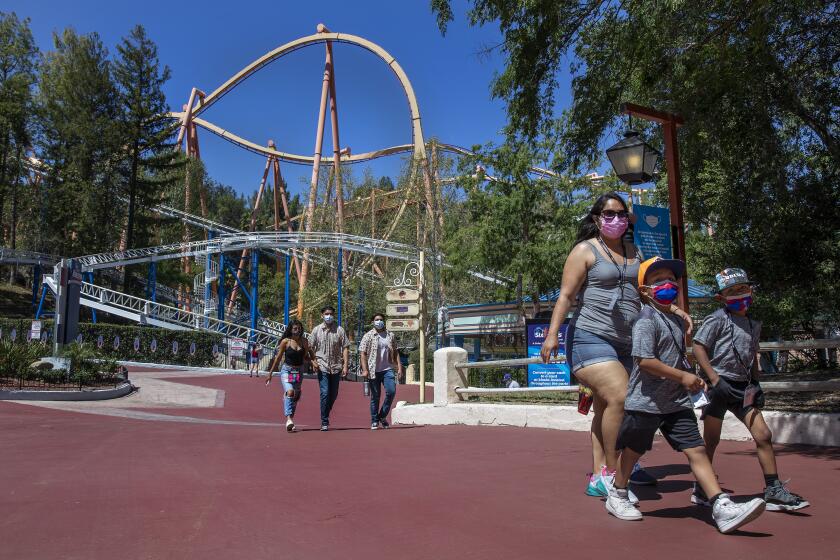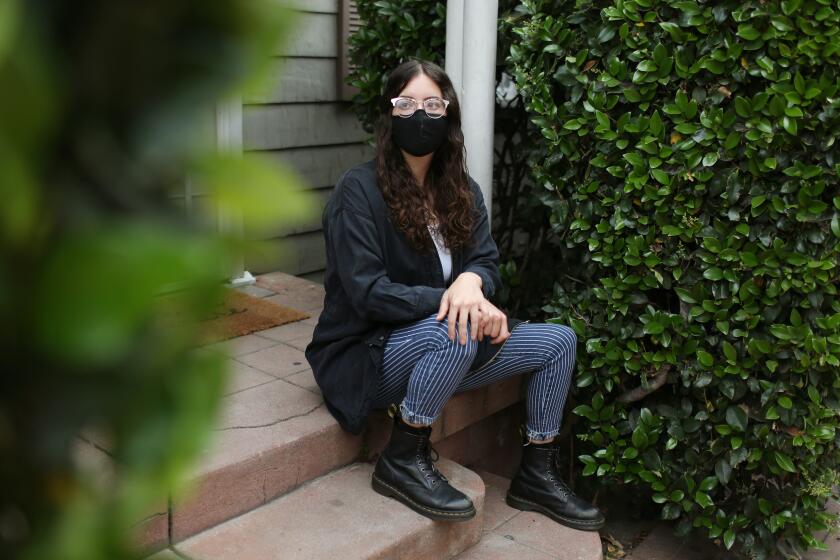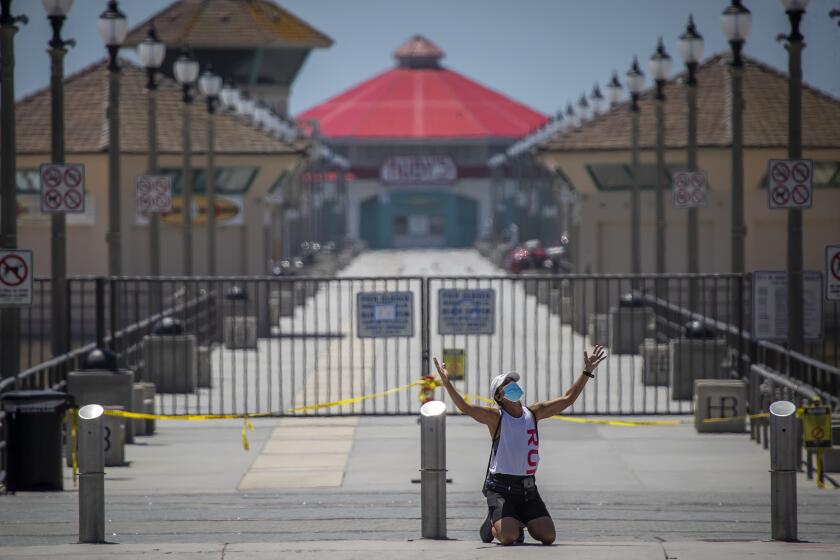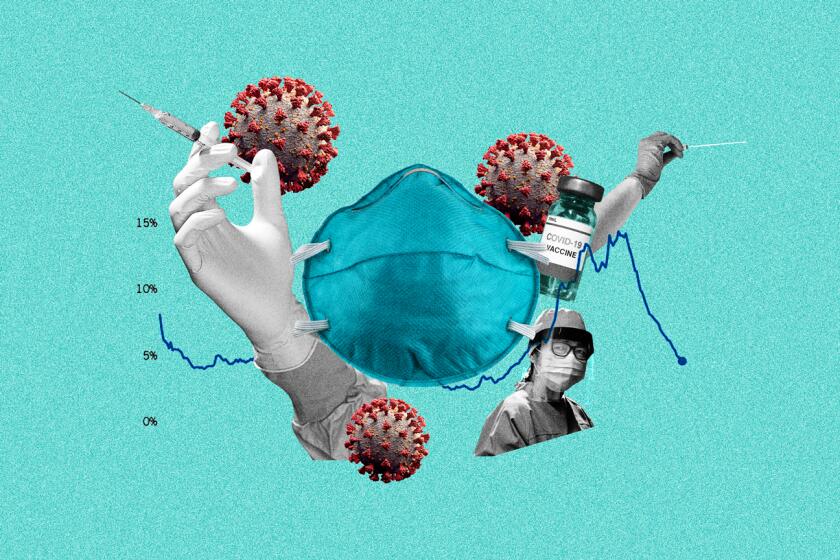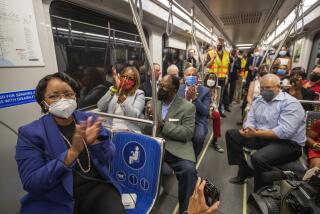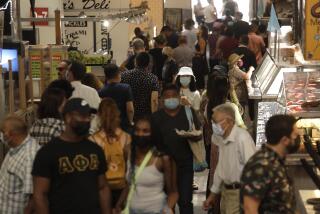To return to a post-COVID normal, we must learn to trust one another again
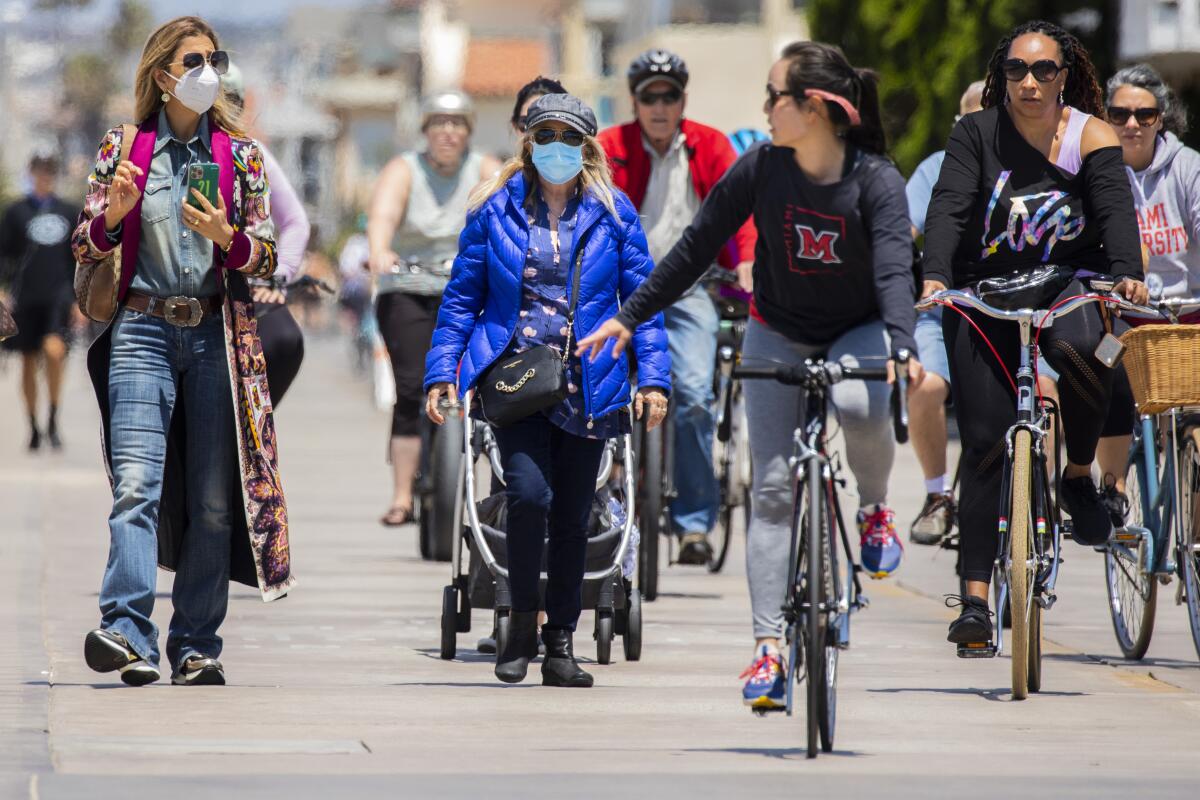
- Share via
Since the coronavirus invaded our lives 15 months ago, we’ve been on an emotional journey that took us through isolation and despair, anger and grief.
Some of us felt envy when others got vaccinated before us, others encountered anxiety as the restrictions that kept us safe for a year were slowly lifted.
Now, as we prepare for a full reopening in California on June 15, we must confront yet another emotional hurdle: our willingness to trust others.
“Trust is probably the most important ingredient in a society,” said Peter Kim, a professor of management and organization at USC. “It’s what allows us to engage in every sort of social, economic and cultural interaction we have in the world.”
Trust is broadly defined as a willingness to make oneself vulnerable in situations involving risk, said Kim, who is writing a book on the subject.
What kinds of activities are safe for families to do when the adults are fully vaccinated but the kids aren’t?
“The risk element has to be there,” he said. “If there is no risk, there is no way to demonstrate trust because there is no downside.”
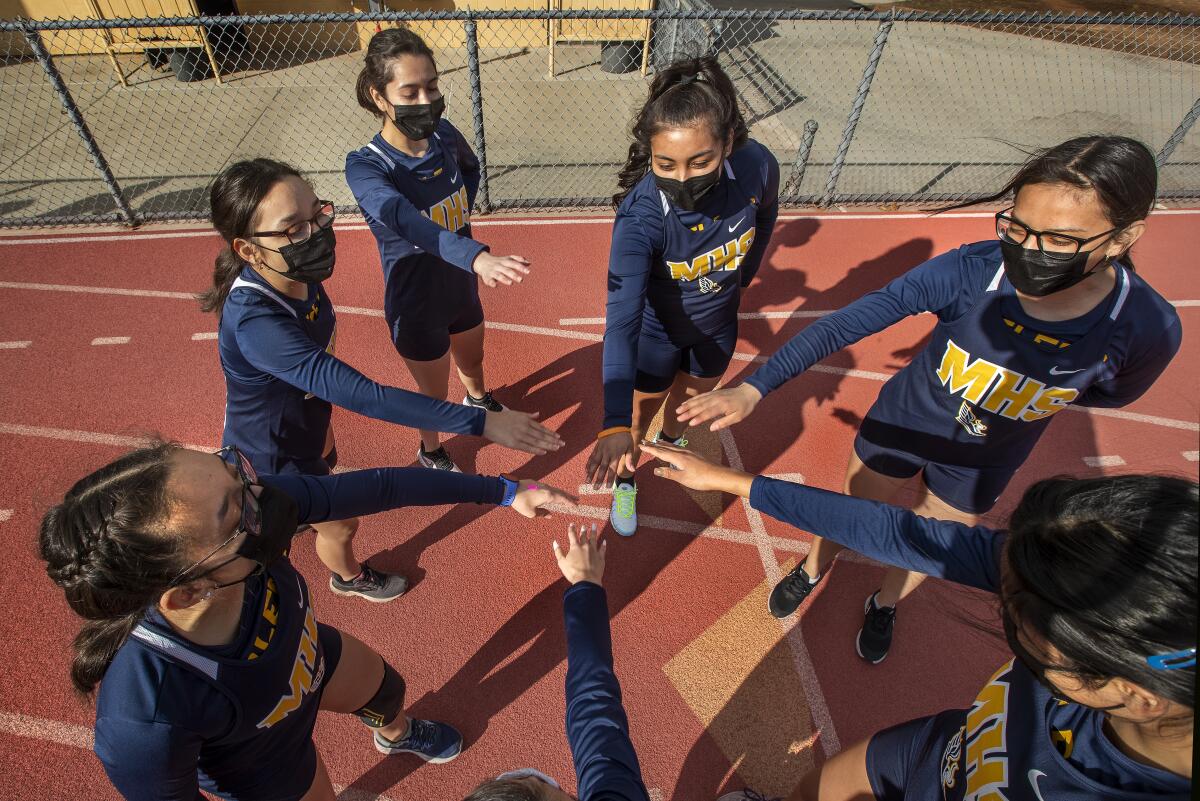
The chances of getting COVID-19 will not be zero anytime soon — even for vaccinated people. So, for all of us to comfortably return to in-person work, send our kids to school and abandon our masks, we will have to rely on multiple lines of trust.
- Trust that the vaccines are safe and work as well as the research suggests.
- Trust that the people we interact with are vaccinated or protecting themselves in other ways.
- Trust that when government leaders say it is safe to remove our masks, or shop in crowded stores, that they are motivated by science, not politics.
“Trust will certainly affect how effectively we manage the recovery process,” Kim said.
Unfortunately, Americans’ willingness to trust one another was already in decline before the pandemic began.
In 2019 the Pew Research Center found that 71% of Americans thought interpersonal confidence has worsened in the past 20 years, and 49% thought their fellow citizens were not as reliable as they had been in the past.
At the same time, three-quarters of Americans said our trust in the federal government had shrunk.
However, a more local survey conducted in January of this year found trust in abundance.
Public opinion data collected by the Center for the Study of Los Angeles at Loyola Marymount University found that 74% of Angelenos trust the scientific community “to do what’s right,” while 70% trust the Centers for Disease Control and Prevention to do the same. Similarly, 69% of respondents said they trust the Los Angeles County Department of Public Health.
We seem to be on the cusp of returning to normal life, but for many people, transitioning back to Before Times is proving to be a lot more fraught than we expected.
“Trust in the scientific community has grown over the past year from 65% in 2020 to 74% in 2021,” said Brianne Gilbert, associate director for the center who co-led the work.
Those high levels of trust were found across a wide range of income levels and other demographics, although people who identified as Black and politically conservative were slightly less likely to feel trust in scientific and public health institutions, she said.
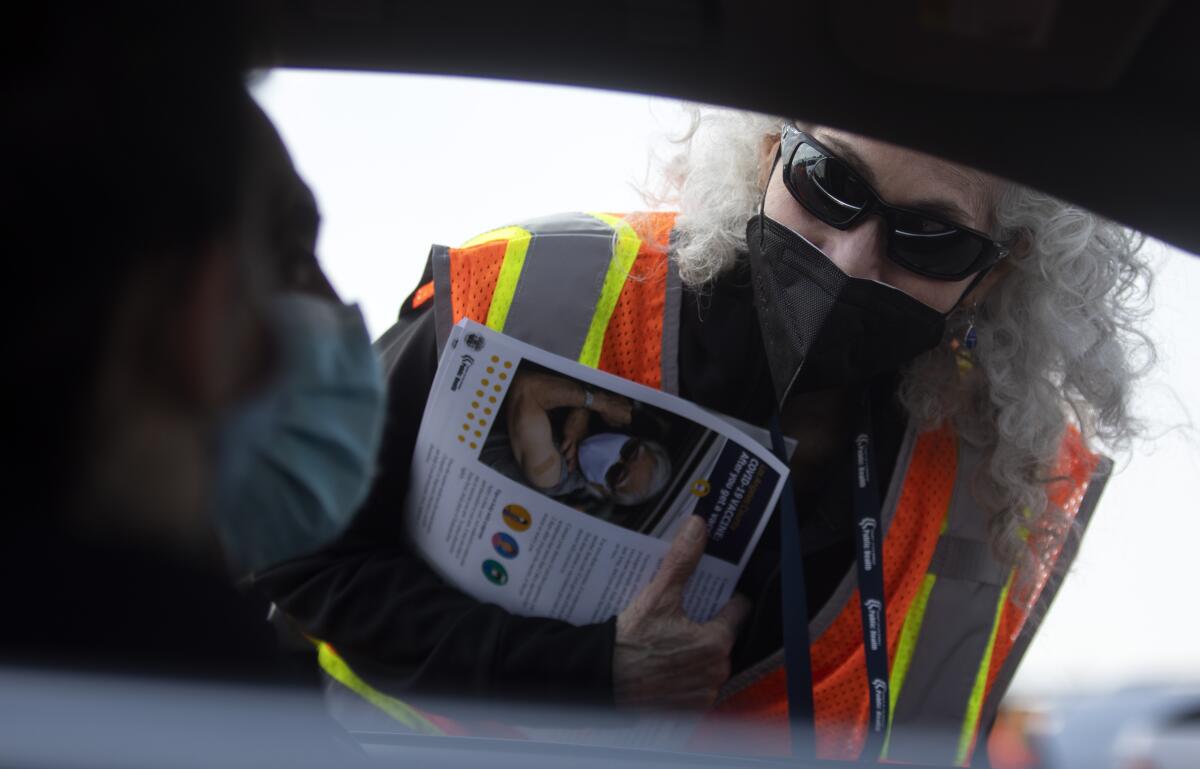
Lorraine Hamblin, 74, of Porter Ranch said she trusted recommendations from health officials such as Dr. Anthony Fauci and Barbara Ferrer, L.A. County’s public health director, as well as supported the many restrictions that were put in place across the county and the state throughout the pandemic.
And yet, even though she’s been fully vaccinated for months, she’s not convinced that it’s safe to return to her old way of life.
She still wears a mask whenever she leaves her home, even just to walk the dog.
“It’s not totally assured that the vaccine will last forever, plus I don’t want to infect anyone else,” she said.
She also finds it difficult to trust politicians who say it is safe for the state to open up on June 15.
“I like Gov. Newsom very much, but I think he’s pandering to the pressure from his constituents,” she said. “I will still wear a mask until I myself am sure that the pandemic has been conquered. I think they are ignoring some important facts we don’t have yet.”
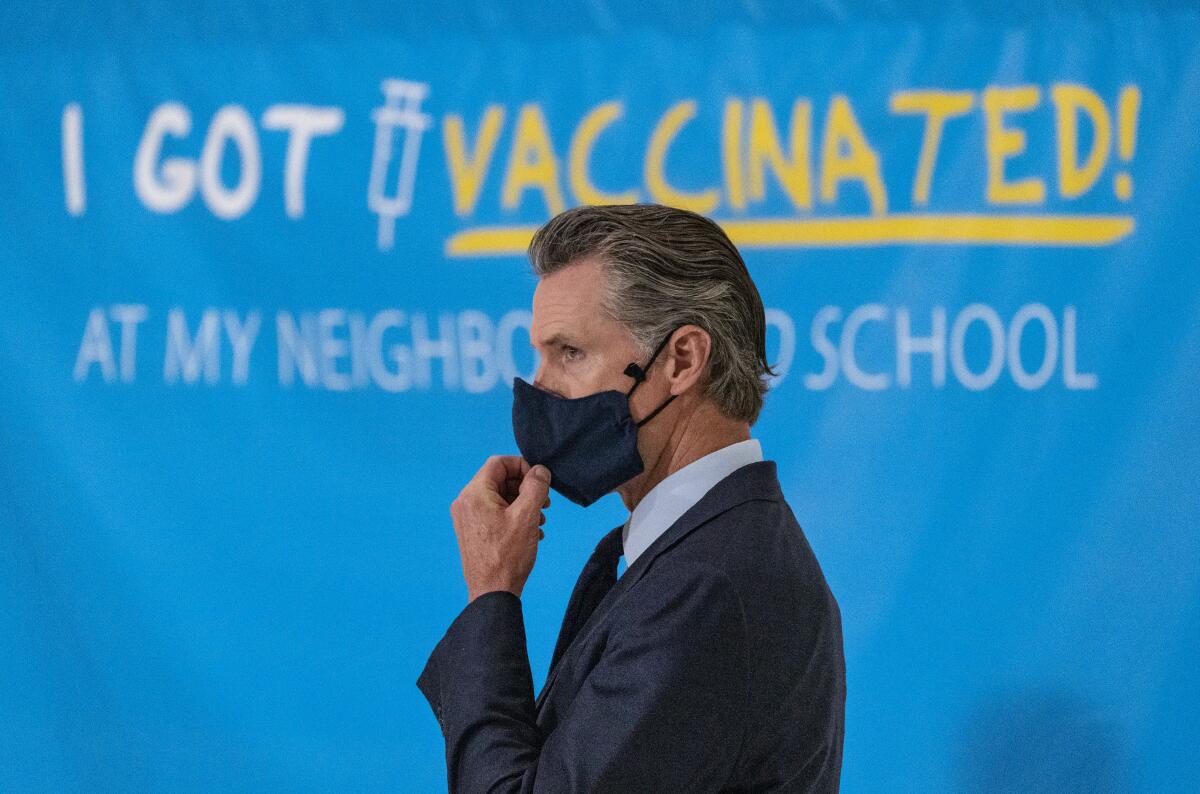
Hamblin said she won’t return to her pre-pandemic life until there is a high vaccination rate — perhaps 90% — as well as a few years of data that demonstrate the vaccines truly perform as promised. She’d also like to see case rates, already falling in the county, plummet further, and better treatments for those who do get sick with from the virus.
Southern California is used to bouncing back from earthquakes, wildfires and other disasters, but COVID-19 brought crisis upon crisis — “cascading collective trauma,” some scientists called it.
Dr. Monica Gandhi, a professor of medicine at UC San Francisco, expects that many people across the state will feel the same way.
In her opinion, fear-based messaging and confusing statements from California’s public health leaders have made it difficult for residents to trust that they could ever return to living normally.
“We told people crazy things, like you can go to a mall that’s at 20% capacity and be around people you don’t know, but you can’t walk outside with another member of a different household,” Gandhi said. “That’s a major contradiction.”
She’s also frustrated that health officials at the state and national levels did not promote a more optimistic message about the effectiveness of vaccines when they first became available.
After a year of being told that any exposure to other people presents a serious risk of infection, Gandhi wonders how many Californians will be willing to go back to life as normal on June 15.
“It’s such an about-face,” she said. “And that cannot generate trust.”
On a national scale, Odis Johnson, executive director of the Johns Hopkins Center for Safe and Healthy Schools, said political polarization and events such as the storming of the Capitol by Trump supporters further eroded the trust Americans have in one another.
“What happened on Jan. 6 laid the field for us to question a number of things, including whether our neighbors and schoolmates will really keep our best interests in mind by adhering to the CDC’s guidelines and advice,” he said.
Are vaccines safe? When can I get a booster dose? Do I have to wear a mask? We’ve answered hundreds of newsletter readers’ questions. Here’s an archive.
In addition, the pause in administration of the Johnson & Johnson vaccine and inconsistent messaging around all the vaccines has also made it hard for many people to trust the inoculations are safe and effective, he said.
“Right now, we have a lot of voices that are not speaking the same language,” Johnson said. “We have local mandates, state mandates and the CDC guidance, and often the local mandates are the strictest.”
So how to build trust given all that? Consistent communication, he said.
“If everyone was on the same page, then perhaps people wouldn’t see vaccines and safety precautions as a political division and ideological divide,” he said.
Emily Brunson, a medical anthropologist at Texas State University, said trust issues are inevitable in a pandemic, but they were exacerbated in the United States because we entered this one extremely divided politically and socially.
“If you were to go back even 10 years in the U.S., we wouldn’t be in the fractured state we’re in now,” she said.
There have been other hurdles. Brunson noted that many people still don’t trust the CDC’s guidance on COVID-19, in part because the agency did a poor job explaining why it initially said masks were not necessary for most people, and then changed course a few weeks later.
“What needed to be transparent at that time is that this virus was really new, and there were going to be unknowns because they didn’t understand certain things about it yet,” she said. “They were not omniscient and they should have communicated that.”
If CDC officials had made it more clear to Americans that they were learning about the virus in real time, and that guidance would probably shift, people may have felt less confused and upset when the agency changed its guidelines, she said.
“Information processing is something we do wrong very often.”
— Isabelle Brocas, USC economist who studies decision making
The challenge of building trust is compounded by another factor — health officials cannot just rely on facts and data, said Isabelle Brocas, an economist at USC who studies decision making.
That’s because humans are hard-wired to process new information in ways that support their previously held opinions, she explained.
“Information processing is something we do wrong very often,” Brocas said.
For example, a recent study found just 0.03% of fully vaccinated people in L.A. County have contracted the virus after being immunized. Scientists and public health workers might see that as evidence that the vaccines are wildly effective. But someone who does not trust vaccines may interpret that same data as confirming their belief that the shots are not 100% effective.
“New information won’t do much to bring people together if their initial opinions are not aligned,” Brocas said. “If they start far away, they will stay far away.”
Getting people to trust one another again will be challenging, Brocas said.
“It is difficult to know how to pull out of it,” she said. “It might just take time, and little by little, things change.”
Eileen Ybarra, 43, agrees.
The librarian, who lives in Glendale, said she trusts that local leaders are not acting recklessly by loosening restrictions.
“From what I understand, the restrictions were there to prevent hospital collapse and that’s not a problem any more,” she said. “At this point, since so much of the rest of the country has opened up, it’s harder and harder for us to stay closed.”
But after spending most of the pandemic at home in her apartment — staying away from friends and family and having necessities delivered to her door, Ybarra said she’ll need some more time to ease back into activities that she knows intellectually are probably fine.
“I feel a whole lot safer than I did before I was vaccinated, but I’m not quite ready to do everything I did before,” she said.
At some point, however, she will want to challenge herself. Her birthday is in late July and she hopes to feel safe eating at an indoor restaurant by then.
She has already bought tickets to two concerts for the fall.
Fingers crossed, she’ll trust it’s safe to see a show by then.
